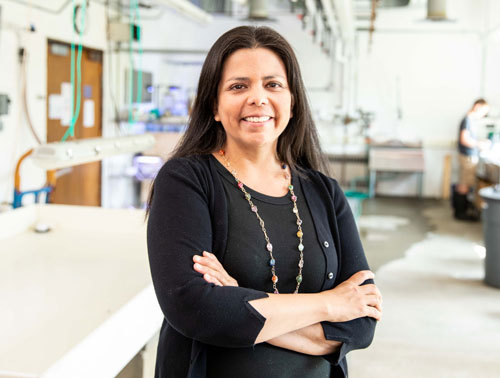Marine Research Student Colloquium
2023 Colloquium: Thursday and Friday, October 19th and 20th
Keynote Speaker
Dr. Jacqueline Padilla-Gamiño

Dr. Padilla-Gamiño is an Associate Professor at the University of Washington in the School of Aquatic and Fishery Sciences. Dr. Padilla-Gamiño studies algae and marine invertebrates' ecophysiology and reproductive biology in a changing environment. By combining field and laboratory techniques, she examines the effects of climate change and marine pollution on coastal ecosystems. She received the NSF CAREER and the Alfred P. Sloan Research Fellowship in Ocean Sciences in recognition of her distinguished performance and unique potential to contribute substantially to the field. She graduated from Universidad Autónoma de Baja California with a BS in Oceanography. Padilla-Gamiño completed an MS in Biology at California State University Northridge, a PhD in Oceanography at the University of Hawaii, and a postdoctoral research fellow at the University of California Santa Barbara. She is interested in science communication and community engagement and is the author of the bilingual children’s book ‘Kupe and the Corals’ which has been translated into five languages.
Why sex is important for ocean solutions in a changing climate
Sexual reproduction is a fundamental process necessary for species persistence, evolution, and diversity. However, unprecedented ocean change due to climate and anthropogenic effects can impact physiological processes with important implications for growth and the ability to reproduce. I will discuss the effects of temperature on marine organisms and provide important recommendations for future research to better understand how reproduction will be affected in the context of a rapidly changing environment. Since models often consider the “reproductive parameter” as a “black box” and/or often overestimate it, I seek avenues to include reproduction in designing and developing better tools to project future ecological trends in response to global change.
- Schedule
- Abstracts of Oral Presentations
- Abstracts of Poster Presentation
- Information for Presenters
Event Sponsors
Colloquium Keynote Speakers to date
The Marine Research Student Colloquium of the Graduate Program in Marine Biology (GPMB) was established in 1998, to increase awareness of research activities by students and faculty affiliated with GPMB; to provide graduate students with experience in making scientific presentations; and to promote interactions among faculty and students conducting research in marine biology.
The following distinguished researchers joined us as keynote speakers in previous years:
2022 Dr. Jeremy A. Goldbogen, Hopkins Marine Station of Stanford University
2021 Dr. Brian Bowen, Hawai'i Institute of Marine Biology, University of Hawai'i at Mānoa
2020 Cancelled - COVID
2019 Dr. Sheila N. Patek, Trinity College of Arts & Sciences, Duke University
2018 Dr. Sandra Brooke, Florida State University
2017 Dr. Billie Swalla, University of Washington
2016 Dr. David Hastings, Eckerd College
2015 Dr. Daniel Huber, University of Tampa
2014 Dr. Dean Grubbs, Florida State University & Coastal Marine Laboratory
2013 Dr. Felicia Coleman, Florida State University & Coastal Marine Laboratory
2012 Dr. Thomas Near, Yale University
2011 Dr. John Bruno, University of North Carolina
2010 Dr. Win Watson, University of New Hampshire
2009 Dr. Erik Sotka, CofC & Dr. Geoff Scott, Hollings Marine Laboratory
2009 Dr. Steve Palumbi, Hopkins Marine Station & Stanford University
2008 Dr. James T. Carlton, Williams College & Williams-Mystic Program
2007 Dr. Peter Wainwright, University of California, Davis
2006 Dr. Jeffrey Levinton, State University of New York at Stony Brook
2005 Dr. Margaret McFall-Ngai, University of Wisconsin-Madison Medical School
2004 Dr. Malcolm Shick, School of Marine Sciences, University of Maine
2003 Dr. Walter Boynton, Chesapeake Biological Laboratory, Univ. of Maryland
2002 Dr. Larry Crowder, Duke Marine Laboratory, Duke University
2001 Dr. Lauren Mullineaux, Woods Hole Oceanographic Institute
2000 Dr. John Pearse, Institute of Marine Science, Univ. of California, Santa Cruz
1999 Dr. Ken Tenore, Chesapeake Biological Laboratory, University of Maryland








